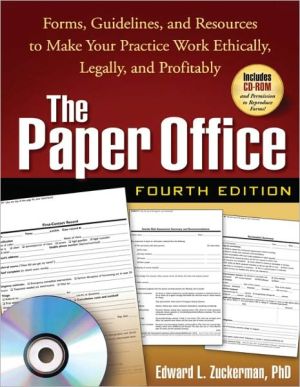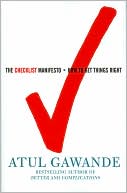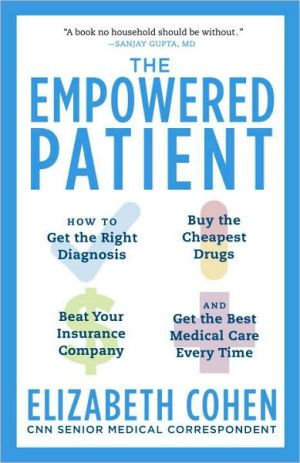The Paper Office, Fourth Edition: Forms, Guidelines, and Resources to Make Your Practice Work Ethically, Legally, and Profitably
Providing the essential recordkeeping and risk-reduction tools that every psychotherapy practice needs, this highly practical resource is ideal for new practitioners who want to hit the ground running and for seasoned pros who want to streamline their paperwork and clinical efficiency. Presented are methods for assuring informed consent and documenting treatment planning and progress; advice on structuring fees, billing, coping with managed care, and marketing; forms and guidelines to...
Search in google:
Providing essential recordkeeping and risk-reduction tools that every psychotherapy practice needs, this highly practical resource is now in a fully updated fourth edition. It is ideal for new practitioners who want to hit the ground running and for seasoned pros who want to streamline their paperwork and clinical efficiency. Presented are methods for assuring informed consent and documenting treatment planning and progress; advice on structuring fees, billing, coping with managed care, and marketing; forms and guidelines to facilitate HIPAA compliance; links to useful websites; and much more. More than 60 reproducible forms and handouts--in a ready-to-use, large-size format--can be copied from the book or customized and printed from the accompanying CD-ROM. Doody Review Services Reviewer:Nicholas Greco IV, MS, BCETS, CATSM(Abbott Laboratories)Description:This is a welcome addition to an ever-changing and complex field of practice in which clinicians are constantly in need of reliable documentation templates. This latest edition is fully updated for current practice, with increased coverage of HIPAA rules and implementation, office safety guidelines, and how to set up a website for a therapy practice.Purpose:As in all of this author's books, The Paper Office is designed to help practicing clinicians do what they do best -- practice. The book is designed to help them and their practices become less vulnerable, more efficient, and more profitable and stable as a business. Clinicians receive the needed guidance on proper documentation using the provided forms, guidelines, and resources, all of which help to ensure an ethical and legal practice. Audience:Both newly minted and currently practicing clinicians will benefit immensely from this latest edition. Not only will clinicians be able to reduce the legal risks of practicing, they will also be able to promote profitability by streamlining documentation. The author is an expert on documentation in clinical practice. Features:What doesn't this book cover? This is one of the most thorough resources on ethical and legal documentation available. The author not only discusses what clinicians need to document, he also demonstrates how with reproducible forms and templates in the book and on the enclosed CD. Having all of the forms on CD alone is worth the price of this book. It covers the most basic documentation needs such as stationery and cards as well as ethical aspects of self-presentation, confidentiality, and release of records. The discussion of working and dealing with managed care organizations is a highlight of this book. Assessment:The author does it again with this fourth edition. All mental health practitioners need to have a copy of this book, not just for themselves, but also for the livelihood of their practice.
List of Figures, Forms, and HandoutsIntroduction 11 Basic Paperwork and Communication Tools 92 Financial Tools and Procedures 413 Reducing Malpractice Risk by Operating Ethically 774 Getting Informed Consent 1765 Intake and Assessment Forms and Procedures 2536 Planning and Then Documenting Treatment 3307 Confidentiality and Releasing Records 385Appendices Resources 439References 447Index 463
\ From The CriticsReviewer: Nicholas Greco IV, MS, BCETS, CATSM(Abbott Laboratories)\ Description: This is a welcome addition to an ever-changing and complex field of practice in which clinicians are constantly in need of reliable documentation templates. This latest edition is fully updated for current practice, with increased coverage of HIPAA rules and implementation, office safety guidelines, and how to set up a website for a therapy practice.\ Purpose: As in all of this author's books, The Paper Office is designed to help practicing clinicians do what they do best — practice. The book is designed to help them and their practices become less vulnerable, more efficient, and more profitable and stable as a business. Clinicians receive the needed guidance on proper documentation using the provided forms, guidelines, and resources, all of which help to ensure an ethical and legal practice. \ Audience: Both newly minted and currently practicing clinicians will benefit immensely from this latest edition. Not only will clinicians be able to reduce the legal risks of practicing, they will also be able to promote profitability by streamlining documentation. The author is an expert on documentation in clinical practice. \ Features: What doesn't this book cover? This is one of the most thorough resources on ethical and legal documentation available. The author not only discusses what clinicians need to document, he also demonstrates how with reproducible forms and templates in the book and on the enclosed CD. Having all of the forms on CD alone is worth the price of this book. It covers the most basic documentation needs such as stationery and cards as well as ethical aspects of self-presentation, confidentiality, and release of records. The discussion of working and dealing with managed care organizations is a highlight of this book. \ Assessment: The author does it again with this fourth edition. All mental health practitioners need to have a copy of this book, not just for themselves, but also for the livelihood of their practice.\ \ \ \ \ From the Publisher"Once again, Zuckerman illuminates the complexities of the day-to-day operation of clinical practice. Among other areas, readers will find the currency of the sections on suicide, violence, and the duty to protect and warn especially useful and informative. From informed consent through termination and record storage, this is an important, 'must-read' text and resource manual for practitioners and clinical trainees alike."--James R. Rogers, PhD, Co-Training Director, Collaborative Program in Counseling Psychology, University of Akron "The Paper Office is already a classic in the field, but this fourth edition kicks it up to the next level. Zuckerman has packed this book full of helpful forms, checklists, and important information that all clinicians need to know. Best of all, it is written for both early-career clinicians and seasoned veterans. Graduate training programs committed to preparing their students for the real work of clinical practice would be wise to make this text mandatory reading."--David Verhaagen, PhD, ABPP, managing partner, Southeast Psychological Services, Charlotte, North Carolina\ "The Paper Office is a comprehensive, hands-on resource for both the novice and seasoned clinician. The fourth edition incorporates changes in clinical practice, changes in relevant case law and statutes, and updated references to the literature. Zuckerman assists the clinician in developing and maintaining a state-of-the-art clinical practice, including record-keeping procedures that cover everything from each step of the treatment process through the closing of your practice at retirement. I have relied on The Paper Office for years, and will use the ideas in this newest edition to update my current practice! I recommend that clinicians from all areas of mental health embrace the ideas and consider using the forms contained in this highly useful book."--Jonathan W. Gould, PhD, ABPP, private practice, Charlotte, North Carolina\ "How many times have you grumbled, while completing clinical, financial, and HIPAA records, 'There must be a better way!'? The Paper Office is that better way--the book and companion CD offer a treasure trove of clinical documents, financial tools, security procedures, consent forms, and record releases. This indispensable fourth edition is guaranteed to reduce your paperwork blues and make you a more savvy clinician!"--John C. Norcross, PhD, ABPP, Distinguished Professor of Psychology, University of Scranton\ \ \ \ The National Psychologist"The Paper Office should be among the most well-thumbed works in the library of virtually anyone in independent practice....Thoughtful perusal of and decision-making based on this volume's detailed, inclusive, carefully crafted information should well equip mental health practitioners to establish or update sound and effective practice procedures and materials. Various chapters walk readers through myriad ethical and practical considerations that should underlie the policies and procedures governing their business....Zuckerman's book goes far beyond the nuts and bolts of procedures and record-keeping, however. Much of its value lies in the information and advice it provides on practicing ethically—and on thinking through challenging or complex situations and decisions. In the third chapter, the book imparts what is perhaps the most concise and crucial advice, with a list of 22 steps for risk reduction. For these nuggets alone, I believe this work is worth its weight in gold....The Paper Office will provide a lifeline especially for new psychologists when the mountain of knowledge necessary for running a practice looms so large. Veteran practitioners, too, will benefit from Zuckerman's newly revised book, particularly if they wish to review or revise their modus operandi or need help moving from handwritten charts into the electronic record-keeping age. Challenges large and small all seem more manageable with Zuckerman's thorough information, logically organized contents, and the sage know-how that comes from years of experience."--The National Psychologist\ \








